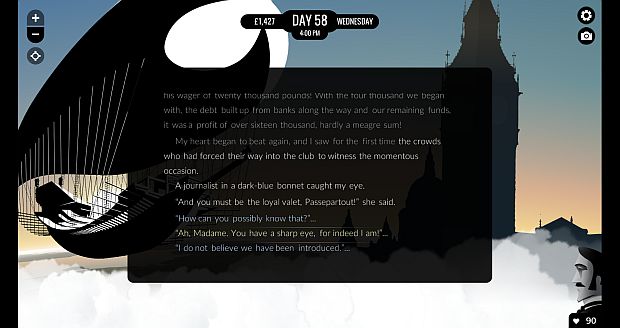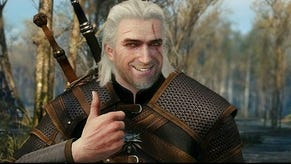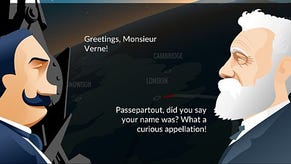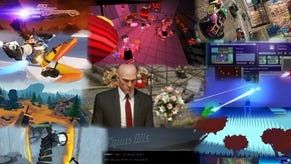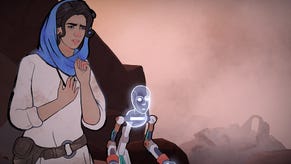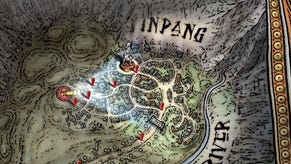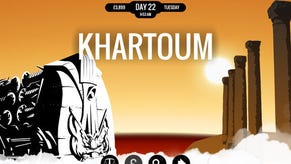How 80 Days Adapted The Modernist Spirit Of Verne
An Interview With Jon Ingold, Joseph Humfrey And Meg Jayanth
80 Days [official site] has finished its journey around mobile platforms and finally arrived at its ultimate destination, the PC. If you read our review earlier this week, you might know I like it.
Back in March, long in advance of the PC version's announcement or release, I met Inkle founders Jon Ingold and Joseph Humfrey alongside 80 Days writer Meg Jayanth. They told me about adapting the spirit of Jules Verne, their responsibility to be progressive, the importance of writing games with people and dialogue, how to make players trust that their choices matter, what Phileas Fogg has in common with James T. Kirk, and what Verne might have thought had he played the game.
RPS: What was the original spark? Was it simply, 'Let's make a game based on Around The World In 80 Days' or...?
Humfrey: Our very first project as Inkle was a project for a book publisher, that we did an interactive version of Frankenstein. We were selling it to the book industry so it was presented as a book with pages of text and that was it.
Ingold: To stress, it wasn't our conception of a project, and we didn't write it. It was written by Dave Morris and it was his idea.
Humfrey: We were always thinking in the vein of, what kind of historical classics can we modernise and what would be suitable for a more gamey treatment? We'd just done Sorcery 1 and we'd kind of discovered that putting an interactive story on a literal map, where you can see the branches on the surface of the map and you can see where you didn't go, it's really powerful. And to just take that as far as it can possibly go, and putting it on a globe where you can go anywhere in the real world, or at least real countries in the world even though it's a fictional adaptation. It gave us so many affordances.
Ingold: Frankenstein was such a pivotal project in some ways. Because the common reaction was, 'My choices don't make any difference; they don't matter; they don't affect anything.' And we'd say, well, actually they do. There's a system under the hood and it's got these options-- but there's no UI to show you that. It just looks like a book that writes itself.
But then we found that when we showed people a story graph of Frankenstein, and then they read it, they said, 'Wow! I just feel so on edge and every choice matters.' It was all about creating that expectation of branching first. So we spent a long time thinking, how do we put a flow chart in an interactive book without it looking like a flow chart?
Humfrey: It's one of the central problems in branching narrative. Creating either the illusion of choice or real choice, but making it clear that your choices matter. The Walking Dead has 'Clementine will remember this.'
Ingold: But even that is really interesting, because the player has to trust it. The moment you start to doubt that Clementine is going to remember that and the more Telltale games I play, the more suspicious I become of that and the less effective it becomes as a technique. Whereas the great thing about a map is - and that's why the multiplayer aspect is there in 80 Days, so that when you're there in Istanbul, not only do you know that you didn't go to Moscow, there's somebody in Moscow right now. And that really hammers it home.
Humfrey: And when you're playing it's very clear that the story within the city is very bespokely written for that city, so you couldn't possibly expect that the story in Istanbul is the same story as you would get in Moscow.
Ingold: It's definitely not repurposed content.
At the same time, it was clearly character-driven. It was clearly driven by the its relationship between two people. And we really wanted to make games with human beings in, and with dialogue and with conversation.
One of the reasons why we moved from - or why I moved - from writing text adventure-y type stuff to choice-y stuff was that you can't do characters in a parser game. I know because I've tried. I wrote Make It Good which is quite a complicated parser game with lots of characters, but the dialogue is automatically stilted by the interface. Whereas in choices it's just very very easy to just do dialogue. And we wanted games with actual people in the game. It felt like quite an important thing to be doing, to make an engaging reading experience.
Humfrey: We just love adventure stories and it's kind of classic adventure fiction, so.
Ingold: And I really wanted to - and I know we're very freely keen on this - but to make a choice-based game where the choices aren't just miserable the whole time. The one criticism I'll really level at The Walking Dead is that it's so bloody bleak all the time, as though every choice has to be depressing.
Jayanth: We had very few life-or-death choices in that way, and they're rarely so emphasised. You're really right because it's much harder to build character with big moments, your character is in the smaller moments. 'This person is smelly. Do I make a face, do I say something to them, do I get up and walk away?'
Ingold: That's so much more interesting for a character than, 'Do I shoot the puppy or do I drown the puppy?'
And as soon as you start to build a game where you have lots of choices, the absurdness of having to make life or death decisions really does start to stack, I think. We really wanted to make something that was much more Indiana Jones than Apocalypse Now. And that was really fun, as it turned out. It was really fun! One of the joys of getting Meg's scripts back was that, though some of them were about slavery and about rebellions, some of them were just ludicrous things about someone losing their hat. And just being able to have straight-up comedy that wasn't goofy? It was just such a relief.
Jayanth: I managed to sneak Fogg possibly having a threesome into it. [laughs] That's my favourite journey; it's Brisbane to Lima.
I think it was like 2 in the morning when I submitted that and you guys were still awake, and you being like, "Meg." After you'd clearly gotten to that bit.
Ingold: There's a comment I think in the script which is, "Yes, I went there." [laughs]
Jayanth: But that flexibility of genre, there are these comedic elements, there are these comedy of manners bits, there's just straight-up adventure stories. You wrote this amazing time travel adventure thriller section, there's a murder mystery, and it all works because of the scale of it. You can actually move from genre to genre without it being genre. The tone can take that.
Ingold: And here the player is making choices the whole time and that's fine. It's just fine. It's not a big deal.
Jayanth: It's also Passepartout that allows you to do that, I think, because his character never changes no matter whether he's playing a comedic role or being serious. You can have these tonal shifts without it feeling like you're playing a completely different character, because it's still Passepartout in a weird situation.
Ingold: It's essentially a TV show. That's basically what we did. It's very, very episodic. That suits the structure of 80 Days; that's another great affordance. We all feel very lucky in retrospect. We could easily have done 20,000 Leagues Under The Sea and we would have been stuck describing fish.
Jayanth: Oh my god, describing fish. It's so hard. Because there's the 20,000 Leagues Under The Sea bit [in 80 Days] and trying to research what fish people knew existed...
RPS: Once you'd settled on 80 Days, how did the other decisions come about? Putting the team together, selecting the format...
Ingold: There's a lot of elements when we look back at it where it just feels like serendipity came together. Not least that we had the concept brewing and we knew we wanted it to be historically grounded but a little bit fantastical and to have nice language but not overbearing language and around that time I happened to play Meg's game Samsara, a StoryNexus game, which is FailBetter's engine, and it's set in, like, an 1800s Bengal. It's somewhat more fantastical than 80 Days, but I read it and it had a good design structure to it, and I was sort of going, 'That really couldn't be a better writing test at the moment, right now.'
Jayanth: All of those little decisions we made at the beginning, which sort of seemed like, we sort of made them because they felt right. Like, yes, it's Passepertout, and right, it's not in first-person, and...
Ingold: The one I felt really strong about was the writing in first-person and not in second-person. Because I'm absolutely sick of second-person writing. It's so difficult not to make it feel childish, and I say that as someone who has written a million words for the Sorcery series at this point. There's something so average about it. And I come from the parser text game background and people used to argue about this stuff quite a lot, and the prevailing thing is that, you have to make it second-person because otherwise the player won't own it, it won't be them. And that gives your player so little credit.
Jayanth: I remember that because I did my writing sample in second person.
Ingold: Did you? Oh yeah! The first thing I did was change it to first because I couldn't read it.
Jayanth: [laughs]
Ingold: I feel like the one thing that I'm really pleased with from an 'art of writing interactive fiction' side of things is a fully working example of a first-person narrative where the protagonist is not you. He's malleable and engaging but he's definitely not you, and that works and it's fine and people don't have a problem with it. Nobody complains about it. Or one in a million people complain about it and I'm really pleased to have that.
Jayanth: And people still say 'I'. I helped someone give birth on an airship. I was kidnapped by airship pirates.
It was really interesting to me. I went from writing 80 Days to writing an island for Sunless Sea, which is 'you', and you're much more of a cipher, and you have to be really careful about implying what the character thinks and stuff like that. So all of the space that we take up with Passepartout is put into descriptions and place and atmosphere. But it creates a totally different effect, the kind of story you tell. In 80 Days, we focus much more on character than on buildings or things. And it would be so much harder to do that if you were trying to write a cipher.
On page two, the rarity of friendship in games, adding steampunk to Around The World, and the responsibility to be socially progressive.
RPS: It's hard to think of many other games that are about friendship in the way 80 Days is. In what other game do you just hang out with another person for a few hours?
Ingold: Back at Sony, when they were brainstorming concepts, they used to talk about a nurture mechanic. That was one of the things they wanted a game to have. And I don't think we ever actually built a game with a nurture mechanic.
Jayanth: Fogg is like your pet.
Ingold: It was talked about and I always thought it was a really interesting idea. If you make the health you're conserving not yours but someone else's. It really, mechanically, is no different at all, but it plays different.
Humfrey: The problem with a lot of games is that when you have a buddy or something that you're supposed to care for, the AI has to be perfect. In a game like The Last Of Us or something, or in Ico, or whatever, otherwise it's infuriating because how could you look after this--
Ingold: I love the fact that Fogg is infuriating.
Jayanth: It sort of splits evenly, doesn't it? I've had as many people say, 'Fogg is a monster, I hate him, I wish I could drown him in the Atlantic,' as go, 'Can you kiss Fogg? Like, seriously, I want to kiss Fogg. Can you kiss Fogg?'
It's also a way for the game to highlight to the player that it's noticing what you're doing. When you come back from an adventure, and you're dressed in ragged harem clothes in Istanbul, and Fogg raises an eyebrow at you and goes, "Hmm." It doesn't have to be anything more than that.
Ingold: Yeah. It's surprisingly effective as a payoff. Because we care about other people.
The thing I really liked about it though is the people who decided to play a game where they're just mean to Fogg, because it's not your health. And so people do use his health like a resource that you can afford to scrape by on. And he says, 'Well I'm feeling terribly unwell.' But they go, 'No no, we'll just go on one more ship, one more ship.' He's struggling along. And no one would ever do that where it was their health, where it was their precious resource, or I think it would be much harder to convince them to. Whereas here not only is it a viable strategy, it's quite a comic strategy, it's got emotional meaning and it's characterful.
Jayanth: You can roleplay that. But it's also so much of the stuff that you wrote that Fogg says, like 'I do not trust you to tend to my person.' Which is what happens. It makes such a difference because you're not only making this strategic choice, but you're also going, 'My Passpertout really cares about the wager, that's why I'm doing this.'
Some of my favourite moments in the game are those Fogg moments. There's a moment where you pick up a balalaika on the Trans-Siberian and like two days later, Fogg is like, "I hate that damn balalaika, put it away Passepartout."
RPS: Verne is famous for his futurist stuff. Around The World In 80 Days is one his books that doesn't have any of that, but 80 Days does. I'm curious about why you made that decision, and who made that decision.
Ingold: There were two things we wanted to do. The first, was that we wanted to capture the spirit of Verne. We knew we weren't going to stick to the text, and Verne as a character is much bigger than [Around The World In] 80 Days. We wanted to reference that and include submarines and rocketships and the things that people think of as Verne-ish, because he's such a character.
The other thing is that, when he wrote Around The World In 80 Days, it was essentially a work of science fiction, because it was impossible to go around the world in 80 days. Travelling around the world quickly was an incredibly modern notion which Verne pretty much invented in fiction. We take it for granted now because it's normal but it really wasn't at the time. It was wondrous. And we can't make 80 Days as was now and have it be wondrous, because travel is not wondrous. It's tedious. It's tiresome. It's frustrating. It's cramped.
So to make that sense of wonder we had to generate a sense of wonder, and the way to do that is to make sure that when you get to India, you really don't know what it's going to be like. Yes, we all know what India is like or we have a sense of it, but you don't know what our India is like, and you don't know what our China is like. And that was really important in making those cities valuable things to discover. I don't know if we ever really entertained the idea of making a more pedestrian version of Around The World which was more accurate. I think we probably did for around 15 seconds and then we were like, that can't work. So by the time we came to Meg, we said, 'We want to make this, and we want it to be steampunk, but we don't really like steampunk. It's a little bit cosplay and a little bit EverQuest.'
Jayanth: And I was thinking, 'Thank god.' I don't really like most steampunk either.
Ingold: And Meg came back with this wonderful idea which was, what would steampunk be like if it wasn't so obsessed with the British Empire? And we were like, oh yeah, that makes perfect sense. So again it evolved multiple affordances, but definitely the short answer is: we needed a sense of wonder. Because the original doesn't have that.
Jayanth: A steam train isn't wondrous anymore. It was at the time.
RPS: There's a theme of social progress throughout the game, both in terms of the relationships you can have and the revolutions you stumble across. Does that tie-in with themes of technological progress? Does that sell, if not wonder, then the idea of a world on the verge of change?
Ingold: I think it does. Again, it's something from the spirit of Verne. Although he wasn't explicitly writing about that kind of thing, he was a modernist and a thinker and I think that sense of a world in change is really important to giving it a sense of motion to it, just like the characters have a sense of motion to them. So the whole game is set to a blur. And I think that's incredibly important. If it wasn't like that, if it felt static, then when you got to a city you'd have a dead stop every time, and you need to be rushing through them. And that really matched the kind of things that we wanted to talk about.
Jayanth: But 1872 is a time of an enormous amount of social change anyway, but Verne understood that with technological change, comes social change as well. The moment you have a railway, communication becomes easier. Ideas spread more easily. So a lot of the social and geopolitiical stuff is actually taken from a few years afterwards, from the 1910s and 1920s, where the world is actually a bit more closely knit, similarly to the way it is in our world.
But it also meant that we could use the fantasy to tell the kind of stories that we wanted to tell. As you invent the clockwork army and airships all over Africa, it made sense for us to also have a world in which 50% of your airship pirates are women, and where progress as it was at the time isn't limited to Europe, and isn't Anglo-centric. The progress and invention is happening everywhere else. Partly, it did happen everywhere else, it's just that history is really whitewashed and so you don't hear those stories so much. And partly, we shift the balance of power deliberately. In the Americas, Haiti is the center of power in the region rather than the United States. We just shift that slightly, so it's postbellum United States. They have a lot of internal problems, so the Haitians have X fantastical invention. It means they're suddenly more powerful in the region, and it's about what does that change, what affects does that have? So it allows us to tell more interesting stories and redress some of the historical problems.
And that is very Verne-ish, as well. Less so in Around The World, but 20,000 Leagues Under The Sea is fairly frankly anti-colonial. It's a critique of colonialism.
Ingold: Also, in Around The World, Fogg goes around the world and falls in love with an Indian woman who he then proceeds to marry. On the one hand, OK, that's a trophy wife by definition, on the other hand, that's a mixed race marriage in 1872. That's Uhura and Kirk kissing on the bridge of the enterprise.
Jayanth: Aouda is deracinated and it's problematic but that's the thing, if Verne could go so far, if we are trying to write Verne today, we have a responsibility to go even further and write something that's progressive for our time. As progressive for our time as Verne was for his.
Ingold: I like to think that if Verne could play it, he'd go, 'Mm, that's cool.'
RPS: Thanks for your time.







